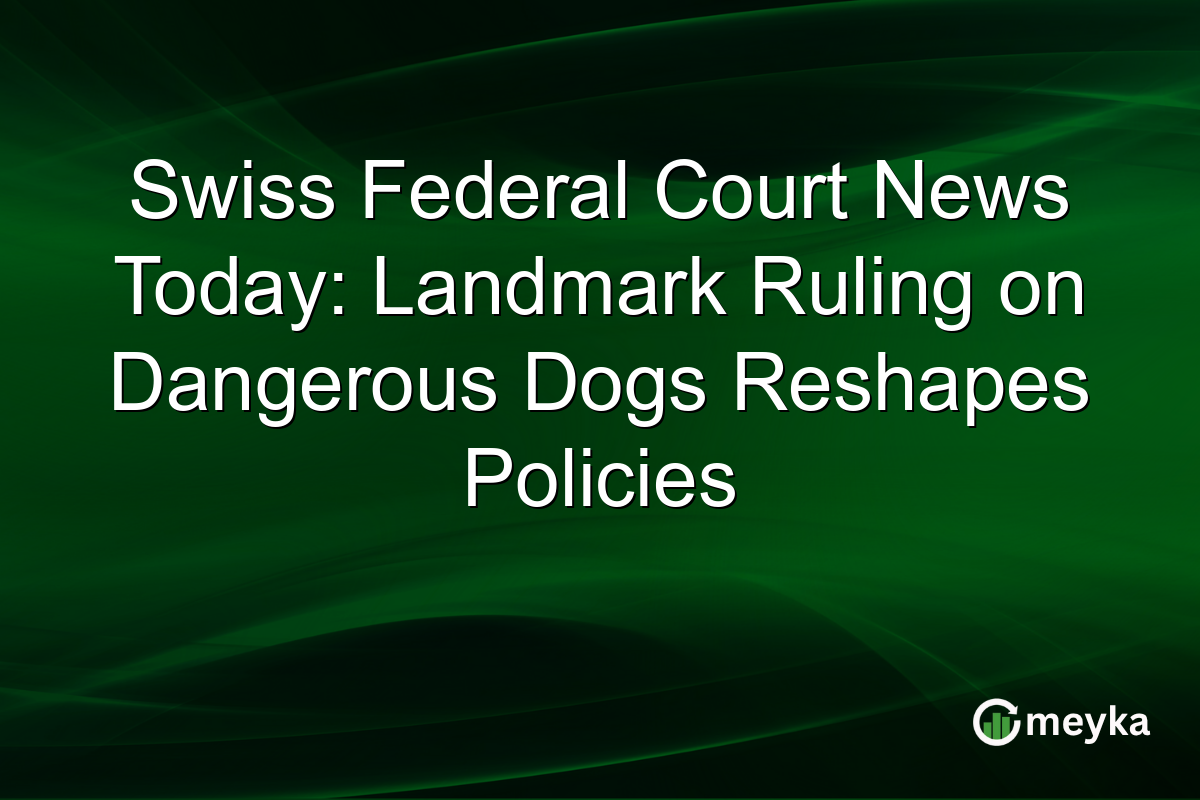Swiss Federal Court News Today: Landmark Ruling on Dangerous Dogs Reshapes Policies
The Swiss Federal Court has made a groundbreaking decision regarding the regulation of dangerous dog breeds. This ruling addresses significant issues around breed restrictions and liability, capturing the attention of dog owners, municipalities, and insurers across Switzerland. The outcome could reshape how the country approaches animal control, making it a pivotal moment in legal governance concerning dangerous dogs.
Understanding the Swiss Federal Court Ruling
The recent Swiss Federal Court ruling provides clarity on issues of dog ownership and breed-specific regulations. Specifically, it affirms the government’s power to impose restrictions on certain dog breeds deemed dangerous, often referred to as “Kampfhunde.” This move addresses public safety and liability concerns that have been growing in recent years.
Breed restrictions, while controversial, are seen by many as a necessary measure to prevent incidents involving aggressive dogs. The court’s decision underscores its commitment to prioritizing public safety, emphasizing that municipalities can legally enforce breed bans and owners might face stricter liability for incidents.
For the full story, see this analysis on Reuters. This decision aligns with a growing trend across Europe where governments are balancing individual rights with community safety needs.
Impact on Dog Owners and Municipalities
Dog owners in Switzerland may now face new challenges as a result of this ruling. Owners of breeds categorized as dangerous will need to comply with additional regulations, which might include mandatory training or insurance requirements. These added layers of responsibility aim to reduce the risk of dangerous incidents but also increase accountability.
Municipalities will have the authority to enforce and monitor these rules, potentially leading to increased administrative tasks and enforcement challenges. This clarity in legal authority allows cities to address local safety concerns effectively, though it could also lead to heated debates about personal freedom versus communal safety.
Insurance and Legal Ramifications
The ruling also has significant implications for insurance providers and legal processes involving dog attacks. Insurers may adjust policies to reflect increased risks associated with ownership of dangerous dogs. This could result in higher premiums or new policy conditions, impacting affordability for pet owners.
Legal processes in cases of dog attacks are likely to become more streamlined, with clearer guidelines on liability. In particular, the ruling may lead to a higher frequency of legal actions or claims against owners following incidents, reinforcing a precautionary approach to pet ownership.
For more insights, check out this report from Bloomberg. These developments highlight how legal clarity is crucial in managing complex societal issues.
Final Thoughts
This landmark Swiss Federal Court ruling marks a significant step in addressing the complexities of dangerous dog ownership in Switzerland. By empowering municipalities and clarifying legal obligations for dog owners, it strengthens public safety measures while acknowledging individual responsibilities. The decision not only affects immediate stakeholders, such as dog owners and municipalities, but also sets a precedent that may influence broader European regulatory trends.
Pet owners and insurers alike must adapt to this evolving landscape, reflecting a growing emphasis on public welfare and safety. Looking ahead, we expect continued dialogue and possible legislative efforts to refine and implement these frameworks effectively. Overall, the ruling paves the way towards a more structured and responsible approach to managing dangerous dog breeds in Switzerland.
FAQs
The ruling allows the Swiss government to enforce restrictions on specific dog breeds considered dangerous. It clarifies legal obligations for dog owners and grants municipalities the authority to implement breed-specific bans.
Dog owners may face stricter regulations and increased responsibilities, such as training and insurance. Owners of breeds deemed dangerous might find higher insurance premiums and more stringent local laws to comply with.
Municipalities gain clear authority to enact and enforce breed-specific bans and restrictions. This empowerment may lead to more comprehensive public safety measures at the local level.
Disclaimer:
This is for information only, not financial advice. Always do your research.






